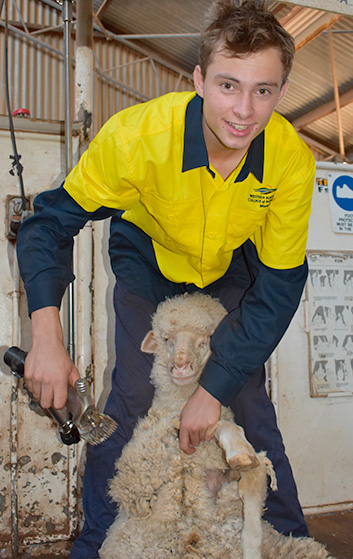
A bit of history about our College
The history of the Western Australia College of Agriculture – Morawa began in 1978 when the first residential students sought specialist agricultural education at Morawa. These students lived in the quarters originally occupied by the single men working on the iron ore mine nearby. By day the students worked and studied on the 200 ha farm, which is where most of the buildings now stand.
In 1984 the Department of Education declared the farm an Agricultural Wing of the local District High School, and with two further land purchases, brought the farms’ total area to 2838 hectares. The neighboring 400 ha property “Granville’s” was purchased in 2001 giving a total of 3242ha.
A new Residential Campus was built in 1992 and in 1995 the College separated from the District High School. On 1st January 2001 our College joined the four other Agricultural Colleges to form the Western Australian College of Agriculture. In 2011 two new 16 bedroom dorms and a six bed medical centre were completed giving the College a boarding capacity of 72 students.
In November of 1999 Morawa was first validated as a Registered Training Organisation and this means that we are registered to deliver Nationally Recognised Certificates in Agriculture, Engineering, Automotive, Horse Care and Aquaculture.
Our College
The Western Australian College of Agriculture – Morawa is situated 360 kilometres north of Perth, adjoining the Morawa townsite. The property is 3,242ha and primarily a broad acre cropping farm with enterprises in Gelbvieh Cattle Stud, Merino and Crossbred Sheep and a Piggery.The College offers a hands on approach to education using traditional classroom teaching combined with learning through Farm Skills, Automotive and Engineering Workshops,and Plant and Animal Science based subjects.
Classroom subjects are delivered using practical and agriculture bias. Students spend one day per week working on the farm ensuring exposure to all facets of farm operation. Half a day is spent in both Automotive and Engineering workshops, and the rest of the week in the classroom. The course, although agriculture based, is a spring board for many career opportunities, placing students in a perfect position to enter the work force, apply for apprenticeships/traineeships or further study at universities or TAFE.The College works closely with Agriculture WA. and the Mingenew Irwin Group (MIG) to develop and trial new and improved farming methods and technologies.
The modern residential campus houses up to 72 male and female students. All students have their own room with a shared bathroom. Dormitories are airconditioned and have a common room with kitchen and television. Dedicated residential staff frequently organise weekend activities including camps, picnics, AFL football games, concerts and day trips.Students boarding at the hostel are welcomed into community activities. Regular socials and school balls allow College students to enjoy the company of the other students from the District High School.
Spring and Autumn carnivals are held between the other residential Agriculture Colleges. Morawa township competes in the North Midlands winter sport competition, this includes; football, hockey and netball. The students are able to play winter sport for Morawa, the hostel staff organise transport to and from the games. Any students are allowed to travel to watch the sport for the day. Sport is played in the surrounding Mid West Wheatbelt towns of Mingenew, Three Springs, Carnamah, Perenjori, Coorow and the coastal town of Dongara.
The College offers Schools Curriculum and Standards Authority (SCSA) accredited subjects at both Year 11 and Year 12 levels. The Year 10 course, introduced in 2005, includes 5 learning areas as defined by the Curriculum Framework.
A full program of enterprises including sheep, pigs, an intensive cattle program and broad acre cropping are offered. Agriculture WA uses the Morawa College Farm for a program of large area cropping trials with students monitoring results. Other trials on new technology and farming practices are carried out regularly in conjunction with industry groups such as Mingenew Irwin Group (MIG).
The College facilities include a modern abattoir, cattle feedlot, piggery, and cattle and sheep-handling complexes. The College has a well-equipped instructional area, including a library, computer network, Automotive and Engineering workshops.
